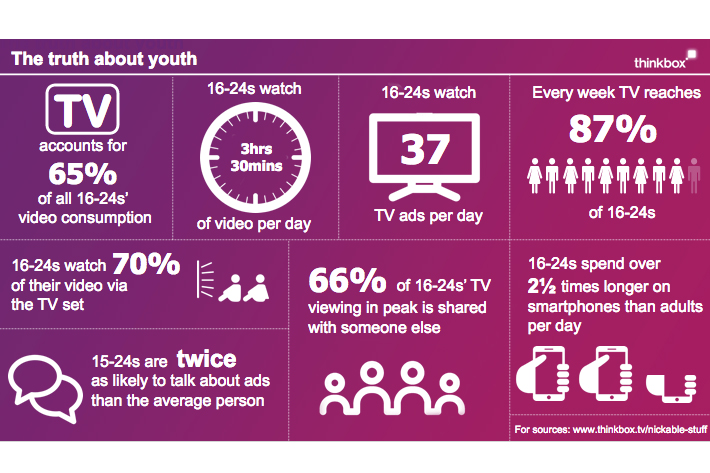
Analysis from Platypus and Thinkbox has shown that TV viewing (live, playback and broadcasters’ VoD services) dominates the video viewing of all ages, with TV accounting for 65 per cent of the total video viewing by 16-24 year-olds, compared to a UK average of 81 per cent. Thirty per cent of 16-24s’ video viewing is on devices such as tablets and smartphones, double that of the average individual at 15 per cent.
“There has been an immense amount of speculation about how younger audiences are watching TV and newer forms of video,” said Matt Hill, research and planning director at Thinkbox. “This research shows that newer forms of video have important roles to play in young people’s lives and that TV remains by far their favourite medium. Different video fulfils different needs and they co-exist happily.”
Fourteen to 24 year-olds have more free time than most and so have a broader spectrum of video viewing that stretches from highly immersive viewing to ‘boredom-busting’, the report asserts. This age group is often constrained in terms of access and control of the main TV screen, with competing demands from parents, siblings or friends in shared accommodation. This was one of the reasons, the report concluded, that this age group watch more video on non-traditional devices.
The report also examines the phenomenon of Vlogging, explaining that its it satisfies the need of young people to connect with others of a similar age who they can relate to and take guidance from.
There is also a desire to learn among this age group, not just out of interest, but for practical purposes. The wide variety and flexibility of short form video content serves this need well. TV also plays an important role, but often at a more aspirational and directional level – hence the ability of a show such as Channel 4’s One Born Every Minute to drive applications for midwifery courses.
The report also looks at the importance of ‘social maintainence’:people like to spend time together, share things together, and find points of commonality. TV plays a very important role in this area, bringing people together through a shared passion or entertainment.
Virtual social maintenance is a newer phenomenon that has been turbo-charged by the rise of social media. It helps explain why younger people in this study claimed to feel so short of time despite being so time-rich. Alongside having to maintain their profile in the real world, they are often continually active in the virtual world, maintaining their online persona. Short-form online video plays an important role here as a currency for gaining kudos amongst friends. TV is also significant in this arena, as social media allows people to virtually share the experience of watching their favourite shows and use TV as a form of social badging and self-expression.
The Truth about Youth study offers indications of how this generation of 14-24 year-olds’ video consumption will develop as they grow older. Eventually most young people are likely to have their own space, and their newfound access and control of the main TV set will influence how they watch video. The amount of free time they have will normalise as they settle into jobs, marriages and parenthood, which is likely to have an impact on their ‘snacking’ on short-form video. As they establish their identities the need to connect as often with others their own age will lessen. This will have an impact on the prominence that video forms like vlogging have in their lives.
Younger people’s perceptions of advertising are broadly similar to the wider population, however, there are some aspects of advertising that are disproportionately important to this age group. They are more likely to favour advertising featuring personalities they relate to. And they are more rebellious and do not like being told what to do – the hard sell is much less welcome.
Joanne Cliff, Platypus Research: “By examining the media habits of this diverse age group in the context of their everyday lives we have gained an enlightening perspective not only about the role of different forms of media for young people but also the specific needs of this age group that are being met in a very different way to other age groups.”







